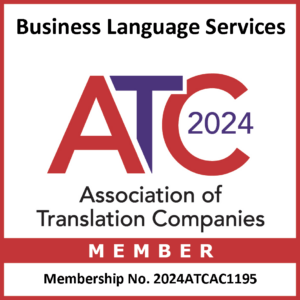30 Years of Trusted Death Certificate Translations
Dealing with the passing of a loved one is always a challenging time, so getting a death certificate translated need not be an added stress. At Business Language Services, our expert team of linguists and project managers will ensure that the process is as simple as possible for you.
Death certificates are legal documents issued when someone passes away. They confirm the name of the deceased and the date, time, location and cause of death. Due to the sensitive and legal nature of death certificates, their translations must always be certified, and often notarised or legalised, so that the translation is recognised and accepted by the authorities receiving it.
As one of the leading translation companies in Wales, Business Language Services has over 30 years of experience in translating death certificates and can help you with every step of the process to ensure that your translated certificate meets the legal requirements of the country and purpose for which you need it.


Certified translations in just four simple steps!
Quick, Simple and Reliable: Certified Translations Made Easy
Our death certificate translation services are designed to make the entire process – from getting a quote to delivering high-quality translations – as simple and seamless as possible:


Why translate a death certificate?
Translations of death certificates are typically needed for one of the following reasons:
- Moving the deceased to another country for burial or cremation
- Making funeral arrangements in another country
- Accessing wills, powers of attorney, inheritance, etc.
- Settling the estate of the deceased
- Family history and genealogy research
How to choose a death certificate translation provider
Since they are almost always for official, legal procedures, death certificate translations must always be certified. This confirms to the authority receiving the translation that it was completed by a skilled professional linguist and that the translated document holds the same legal status as the original.
Only an accredited linguist or translation company can certify a translation, as this requires a stamp from a recognised translation industry body. The three such bodies in the UK are the Association of Translation Companies (ATC), the Institute of Translation and Interpreting (ITI), and the Chartered Institute of Linguists (CIOL), all of whom endorse each other’s certification procedures and guidelines.
Business Language Services is an Accredited Member of the Association of Translation Companies (ATC), so you will see our ATC stamp on any certified translation we provide (except ‘sworn’ translations, due to their specific requirements). This stamp is your seal of quality and accuracy and is recognised by all major institutions.


Death certificate translation from £66!
The exact certification requirements for death certificate translations vary from country to country.
We offer four levels/types of certification, depending on your requirements:
Certified translation
Certified Translation is the standard level of certification needed for any translation for legal purposes. The translation includes our ATC stamp and a verification letter, signed by a project manager or translator, certifying its accuracy. Certified Translation involves:
- Translation by a native-speaking professional
- Editing by a second experienced linguist
- Proofreading and formatting checks by your project manager
- Certification using our ATC stamp and verification letter
- Delivery of scanned copy by email, hard copy via first-class post to your UK address
Notarised translation
Notarisation provides an extra level of guarantee on top of our standard certification. Notarisation is often required for government, legal submissions, and sometimes for job or education applications. Notarised Translation involves:
- Translation by a native-speaking professional
- Editing by a second experienced linguist
- Proofreading and formatting checks by your project manager
- Certification using our ATC stamp and verification letter
- Notarisation by our trusted Notary Public
- Delivery of scanned copy by email, hard copy via first-class post to your UK address
Legalised/Apostilled translation
Legalisation (also known as apostille) is the highest level of certification typically available in the UK. Legalisation (apostille) is normally required if you plan to use your documents outside the UK in countries that are parties to the Hague Apostille Convention. Legalised (Apostilled) Translation involves:
- Translation by a native-speaking professional
- Editing by a second experienced linguist
- Proofreading and formatting checks by your project manager
- Certification using our ATC stamp and verification letter
- Notarisation by our trusted Notary Public
- Legalisation by the FCDO
- Delivery of scanned copy by email, hard copy via first-class post to your UK address
Sworn (in-country)
Although the concept of ‘sworn’ translation does not officially exist in the UK, many other countries may require the translation to be completed by a ‘sworn’ translator.
‘Sworn’ translation is only needed in countries where the concept exists and when specifically requested by the organisation to which you are submitting the translation. ‘Sworn’ Translation involves:
- Translation by a native-speaking professional
- ‘Swearing’ of the translation in front of a solicitor, if applicable in that jurisdiction
- Delivery of scanned copy by email, hard copy via first-class post to your UK address
Every project is unique, so the above prices are estimates only. In order to provide an accurate quote for the cost and turnaround time for your translation, we will need to analyse your document(s).
Choosing the right certification for your death certificate translation
The exact certification requirements for death certificate translations vary from country to country – some require a signed certification letter from the translator, while others require ‘sworn’ translation, where the translator swears the translation in front of a solicitor.
The organisation to which you are submitting your translation will know what level of certification they need, so we advise checking with them to ensure that you do not pay for a higher level than you need. Our expert project managers are also happy to advise you on the level of certification you might need.



How long does it take to translate a death certificate?
Standard Certified Translation of a death certificate typically takes around a full working day to translate, edit, proofread and certify, so you can expect to receive the translation 2 working days after we receive the source file.
If Notarisation is needed, this usually adds an extra working day on top of the standard certification timeline, so notarised translations are generally completed in a total of 2–3 working days.
Legalisation (apostille) takes longer still, as this requires paper copies to be posted to the FCDO. This generally adds around a week to the turnaround time after the translation is completed. It is possible to get your translations legalised independently, but our express service is significantly quicker.
Frequently asked questions
Here are answers to some of the most frequently asked questions about death certificate translation.
Do you need the original death certificate?
In most cases, no. A scan or clear photograph of the death certificate is sufficient for a Certified Translation. If you do not have access to a scanner, you are more than welcome to bring the certificate to our office, and we will be happy to scan it for you.
However, if Notarisation or Legalisation is required, then our Notary Public and the FCDO will need to receive the original paper certificate to verify that it is genuine. We will let you know if this is needed.
Does it matter if my death certificate is damaged?
Provided that all the text is still legible, it does not matter if there is some light cosmetic damage (e.g. creases) to the original death certificate. If any text is missing or illegible, though, you might need to request a new copy of the certificate from the issuing authority, so that we can ensure that the translation is complete and accurate.
My death certificate contains handwriting. Is that alright?
Handwriting can lead to many potential issues with legibility and can affect the accuracy of the translation if it is misinterpreted. If your death certificate contains handwriting, we will type it out and ask you to confirm that everything is spelt correctly.
If we are translating to/from a language that does not use the Latin alphabet (e.g. Arabic, Chinese, etc.), it will be very useful if you can provide reference materials showing how the name(s) of the deceased should be spelt in both writing systems.